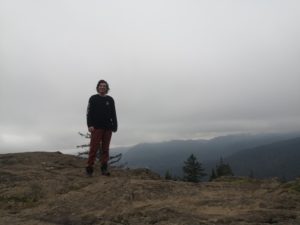Kit Caudron-Robinson was working on the oil rigs in Alberta, but it wasn’t what he wanted to be doing. After listening to one of his three older sisters, a practicing lawyer, talk about how going back to school would be the best possible thing he could do, he enrolled at Camosun with the long-term goal of going into Indigenous Law at UVic.
Now, the first-year University Transfer student is one of five first-years who won the CIBC Entrance Awards for Indigenous Students, awards aimed to help ease financial tensions during students’ first year of studies.

Originally from Driftpile First Nation in northern Alberta, Caudron-Robinson, who is Cree/Métis, says he was urged to go to school because of the circumstances created by life during COVID-19.
“The pandemic hit and we were just hanging out and partying lots, and I woke up one day and I was like, ‘Well, this is getting to be a little bit tedious; I’m kind of sick of it. Let’s go do something else,’” he says.
When she graduated from law school, that same sister gave Caudron-Robinson a blanket as part of a blanket ceremony.
“I still have that blanket,” he says. “And I want to give it back to her when I’m done.”
Caudron-Robinson says that Indigenous people can get kicked around, but they’re still here.
“Don’t let anybody tell you you can’t do anything,” he says. “We’re still out here, and we’re still alive, and we’re still kicking it. They tried, they did their best, but we’re still out here. Got to make sure that they know, that everybody else knows, we’re still here, so that’s kind of what I’m trying to do.”
Part of Caudron-Robinson’s reason for going back to school was to reconnect with his culture—he has been taking a few Indigenous Studies classes, and despite a focus on social work, half his courses up to this point have been in Indigenous Studies, which comes down to wanting to “do right by my community,” he says, “and be able to put Indigenous people into positions of power.”
“There’s a lot of space that has been created for us in different ways, but oftentimes that doesn’t end up meaning much until you have somebody there who’s really going to take the full advantage of it,” he says.
But Caudron-Robinson had his reservations about accepting the award: he wondered if taking the money would make him complicit with a big cooperation patting itself on the back for helping out Indigenous students. But he realized after speaking with his sisters that it was important to not be too proud. Caudron-Robinson says that if you don’t want to use the system in positive ways when the opportunity presents itself, doing something for your community won’t extend much further than, say, giving your cousin money for a pack of cigarettes.
“It’s really neither here nor there,” he says, regarding his hesitancy about using the money to further his education. “If the space is there, take advantage of it. You have to make the system work for you more than the system works against you. And the system works against Indigenous people in a lot of different ways.”
The other winners were Denae Edgar from the Ditidaht First Nation, Zoe Cameron-Johnson from the Peguis Nation, Kona Loedden, who is from Waterhen Lake First Nation, and Devin Sheehan, who is Métis and from the Red River area of Manitoba.
